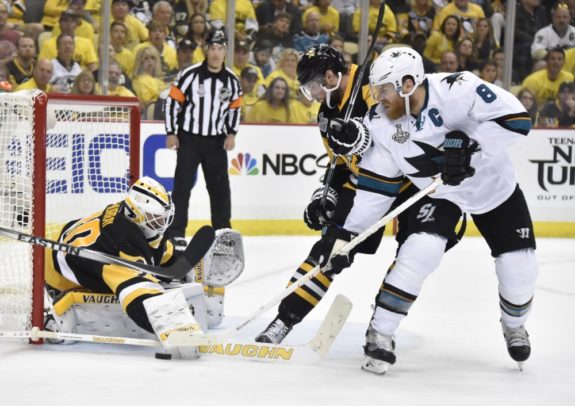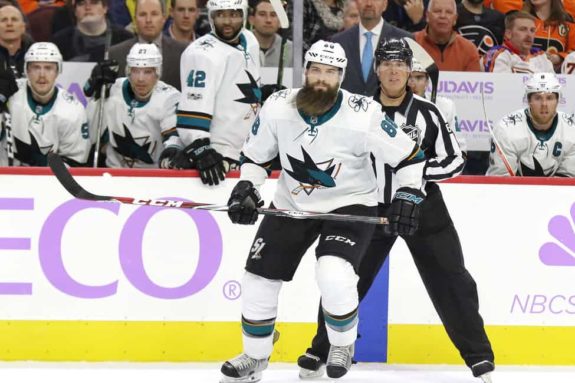Coming out of their league-mandated five-day break, the San Jose Sharks will play their 41st game of the season against the Calgary Flames. In terms of games played, this is the midpoint of the season.
In the second half of the season, there are several keys San Jose must address to propel the Sharks into the Stanley Cup playoffs. As of now, they are in a playoff spot, but even a modest downtick will result in the Sharks missing the playoffs.
The issues include potential trades and player health. The former is in the hands of general manager Doug Wilson; the latter often comes down to fate. For the Sharks, two players are vital: Marc-Edouard Vlasic and Logan Couture. As long as both are mostly healthy the rest of the way, the Sharks should be in good shape on this front.

Beyond injuries and trades, five things stand out.
A Compressed Schedule
Through 40 games, the Sharks played the least dense schedule of any team in the league. To balance this out, the Sharks must play the densest schedule of any team from this point forward. This means 42 games in 84 days. They’ll need to be smart about resting players, using line balance and so forth to mitigate this challenge.
The Sharks have depth at forward, on defense and in goal. Mitigating this dense schedule (which rivals last season’s ‘compressed’ schedule) is achievable, but it is not a given. It is something Sharks head coach Peter DeBoer must actively manage, and it is something he struggled with previously. Last season, DeBoer stated the Sharks “ran out of gas” in March. To make the playoffs, the Sharks must not run out of gas this season.
The Joes
Joe Pavelski and Joe Thornton are minus-7 and minus-11 respectively. These are career lows for both players. Now in his 12th NHL campaign, Pavelski has never finished a season as a minus player. For Thornton, it’s happened only once in his last 15 seasons. While it’d be great for each player to wind up positive on the year, simply stopping the descent might be enough for this team. Pavelski and Thornton lead the Sharks forwards in ice time this season. It is not good when your ice time leaders are having a difficult time competing at even strength.

Pavelski has not looked right all season while Thornton is coming off major knee surgery. Improvements are not a given, but there is reason for optimism with this pair. The Sharks’ young power forward, Timo Meier, is showing recent progress as the duo’s new left winger. Importantly, he is a complementary fit. The Joes, as they are affectionately known, have thrived with bigger, more powerful forwards on their wing. Brent Burns and Tomas Hertl are examples of this. The physical Meier also fits the bill.
Ultimately, the Joes don’t need to carry this team as in years past. But they can’t be a drain on it either.
Brent Burns
We discussed Burns, at length, in this prior article, so there is no need to repeat it all. Suffice to say, the Sharks’ 5-on-5 effectiveness must improve with Burns on the ice. Some of this is on the team and some is on Burns. The Sharks score 56 percent of the 5-on-5 goals when Burns is off the ice (goals-for percentage or GF%). They score just 30 percent when he is on the ice. It’s not good when your ice time leader and All-Star Game representative is also last in the league in GF%.
Martin Jones
The Sharks’ starting goaltender was the best goalie in the league early in the year. In a 15-game stretch, Jones allowed two or fewer goals in 13 times. Jones suffered a seemingly minor injury in late November and missed a week. This seemed to derail his game.

The challenge for Jones is simple. Last season, his save percentage consistently declined over the course of the season. In the January-April portion of last season, he posted a miserable .905 save percentage (he is below .900 since returning from injury this season). Jones must avoid a second-half slump for the Sharks to make the playoffs.
Jones’ backup, Aaron Dell, has been good all season. If Dell retains his form and Jones can return to the form he had in October and November, this duo can take this team a long way.
Penalty Kill
At the heart of the Sharks’ success is the penalty kill. It still ranks among the league’s best, but a recent decline is troubling. The Sharks have allowed a power-play goal to their opponents in six straight games. To start the season, they allowed a power-play goal in just six of the first 24 games. Repeating the early-season results can propel the Sharks up in the standings. However, the recent stretch of giving up a goal per game has to end. San Jose is a low-scoring team; winning the special teams battle is a huge part of their equation. Special teams, especially the penalty kill, are essential to San Jose’s playoff push.

The Playoff Track Record
The Sharks have a track record of making the playoffs. This team won’t be overwhelmed by the pressure of a playoff chase. But getting there is far from certain this season. Six teams in the Western Conference seem to have solidified their playoff fate. Winnipeg, Nashville, and Vegas appear in, while Arizona, Vancouver and (most likely) Edmonton are out. The remaining nine teams, including the Sharks, are tightly grouped in the battle for five playoff spots. To make the playoffs, the Sharks will need to effectively address their key issues.